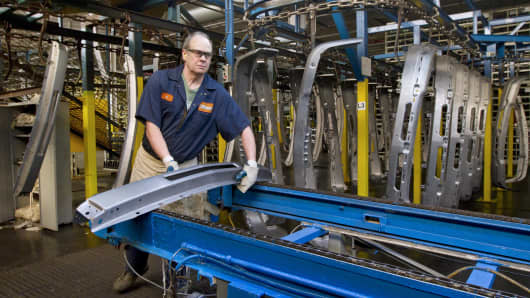The U.K. economy contracted more sharply than expected in the final quarter of 2012, the country's statistical agency said on Friday.
Gross domestic product (GDP) in the fourth quarter fell by 0.3 percent over the third quarter. The average estimate among economists was for a drop in output of 0.1 percent.
George Osborne, the U.K.'s finance minister, said the data was a reminder that Britain faces a very difficult economic situation.
"We can either run away from those problems or we can confront them. I'm determined to confront them so that we can go on creating jobs for the people of this country," he said at the World Economic Forum in Davos.
(Read More: UK's Osborne: Wrong to Abandon Austerity Plan )
Economists are concerned about a triple dip recession, with the U.K. economy seen contracting in the first quarter of 2013 as well. However, the U.K. economy grew 0.9 percent in the third quarter of 2012.
On Thursday, Osborne told CNBC in Davos that the government would stick to its austerity plan, despite criticism from the IMF.
Sterling fell to its weakest level in 13 months against the euro and its lowest level in five months versus the dollar.
"With the economy suffering a renewed GDP dip in the fourth quarter of 2012, the definition of the current state of the U.K. economy as DIRE needs to be amended from Disappointing Inflation Rotten Expansion to Disappointing Inflation Reduced Economy," Howard Archer, chief U.K. economist at IHS Global Insight said in a research note.
"While we believe the economy is essentially flat at the moment, it is worrying to note that GDP in the fourth quarter of 2012 was 3.3 percent below the peak level seen in the first quarter of 2008. We suspect that GDP will not return to the level seen in the first quarter of 2008 until the first half of 2015 – a gap of seven years."
(Read More: Why the UK Jobs Number May Be Misleading)
But Graeme Leach, chief economist at the Institute of Directors, said it was time to "hold back on the doom and gloom."
"The GDP fall was largely attributable to the unwinding of the Olympic effect and so the underlying story is that output is flat," he said in a statement.
"The critical factor is not what the GDP figures did in [the fourth quarter] but what the broad money supply figures will do in [the first quarter]. If the recent slight pick-up in money supply growth can be sustained, the U.K. economic outlook in 2013 will be better than people expect."


